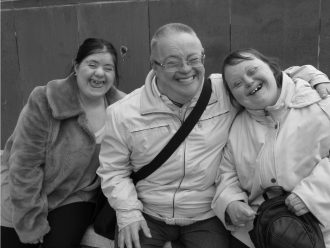People Like us

Archive for memories rarely recorded
A unique archive collating experiences of people with learning difficulties is being created by a Liverpool charity. Wicked Fish, a theatre company that provides performing arts and life skills training, will work with a small group of participants to run and deliver the community history project, People Like Us.
“Our members, who are all performers who have Down’s Syndrome, became interested in family history through an IT skills training session we were doing,” said Di Christian, creative director at Wicked Fish. “Family history is so popular now, but we realised there was very little information about people with learning difficulties and very few, if any, recordings of people with learning difficulties telling their own stories.”
Wicked Fish will work with eight partners to produce the archive and an exhibition at the end of the two-year project, entitled From There To Here, to be shown at the Museum of Liverpool. Partners include North West Sound Archive, Liverpool Record Office, National Museums Liverpool and Moving on with Life and Learning (MOWLL), a charity based at Liverpool University working with people with learning disabilities, brain injuries and mental health conditions.
‘Suffered’
The content of the Heritage Lottery funded-project will focus on the participants’ first day at school, an experience common to everyone but one that can evoke unhappy and even traumatic memories for people with learning difficulties.
“Before 1970, education for children with learning difficulties was the responsibility of local health authorities rather than education authorities,” said Christian. “Provision was often inadequate and poorly monitored, and some people suffered dreadfully. We need to hear their voices and stories first hand.”
Permanent collection
Because participants may find dates and names difficult, the archive will be created from visual content and voice recordings as well as written material. They may collect photographs of significant places, or create memory boxes that evoke smells and sounds to support their spoken experiences. The oral archive will be given to North West Sound Archive, and the transcriptions of the interviews to Liverpool Record Office. The Museum of Liverpool will keep some of the artefacts for its permanent collection.
Participants will be in charge of content. They will receive training in oral history methods, recording equipment and selecting appropriate material, with emotional support on hand because of the sensitivity of the project.

No Comments
Add a comment about this page